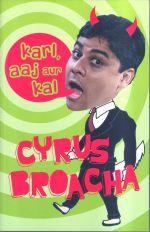 Karl, Aaj Aur Kal is comedian-actor-veejay Cyrus Broacha's first work of fiction and is all set for its official launch this week. In the publishers' words, it is 'a novel about celebrities, Bollywood and politics' and traces the lives of two young best friends, Karl and Kunal, giving a humorous, tongue-in-cheek and witty account of how they make it big in tinseltown. By way of an excerpt, we bring you the prologue that introduces you to the story and its characters:
Karl, Aaj Aur Kal is comedian-actor-veejay Cyrus Broacha's first work of fiction and is all set for its official launch this week. In the publishers' words, it is 'a novel about celebrities, Bollywood and politics' and traces the lives of two young best friends, Karl and Kunal, giving a humorous, tongue-in-cheek and witty account of how they make it big in tinseltown. By way of an excerpt, we bring you the prologue that introduces you to the story and its characters:
In many ways, Karl and Kunal were like most boys their age. They shared a passion for the four things schoolboys seem to love most: bunking class, films, food and pornography. And growing up in 1980s India -- when people went to the movies only to watch Amitabh Bachchan -- they must have been among Amitabh's biggest fans. That Amitabh was the King of the silver screen was a plain fact, just as night followed day, and Marlon Brando once weighed less than 400 pounds.
The two boys were entranced by a film called Amar Akbar Anthony in which Amitabh played a heroic vagabond, Anthony. It was at about this time that Karl discovered his passion for theatre. The noblest of reasons drew him to the stage: the need to perform and express himself but chiefly, the desire to bunk class. It was well known that anyone who was chosen for the school play would get to bunk the last two periods of the day, which were used for rehearsal.
The play that year was The Frog Prince and the parts up for audition were for the princess, the prince, and the frog. The princess's role suited Karl's artistic temperament the best, as it involved lying supine with eyes closed for the better part of the play, and only occasionally pushing away the frog in disgust. However, the school didn't want to waste money on a wig, so a real female was used. The next role that beckoned was the prince's. It was one of those forceful quality-over-quantity roles. You appeared on stage for a total of seven seconds, and that too at the fag end of the play. No great thespian skill seemed necessary: the entire act consisted of opening one's eyes and hugging the princess, after glimpsing whom one felt tempted, in any case, to shut one's eyes immediately.
But the drama teacher, Mrs Sahyani, took one look at Karl and shrieked ecstatically, 'There's my frog!' This was followed almost immediately by, 'Stop my frog!' as Karl prepared to flee, and, finally, 'Somebody catch my frog, pin him down, and bring him here ASAP!'
Mrs Sahyani looked proprietorially down at her frog while it tried to explain, in vain, that it had never played a frog before. In fact, Karl had never really known a frog and didn't even know of anyone who might. Furthermore, he couldn't distinguish between a male frog and a female frog, or between a frog and a road. He ranted on about his family being more of a dog family than a frog family, and said that if he had to play the part of an animal, he would be far more accomplished as a goldfish or an elephant. When all this fell on deaf but finely groomed ears, he offered Mrs Sahyani a 'compromise candidate'. A boy who, Karl assured Mrs Sahyani, would play the part perfectly -- his best friend, supporter, and confidant, Kunal. Mrs Sahyani would have none of that. She cast him with immediate effect.
Mrs Sahyani was a realist. And a frog would have to appear shorter than the other actors. Thus it came to pass that a dismayed Karl suddenly found himself in a half-squat position on an empty stage during the last hour of school.
After the play was performed, Karl, like most great actors, made a smooth transition into his next role -- from a frog to Anthony. His friend Kunal had styled himself after the other leading heart-throb in Amar Akbar Anthony, Vinod Khanna, who played Amar. Karl started referring to himself both in the third person and as Anthony. He also began to make definitive and dramatic statements. If told that dinner was ready, he would reply, 'Dinner may be ready, but Anthony isn't.' His father Jehaan, an English movie buff, once asked in perplexity, 'But who is Anthony?' To which Karl responded with a flick of his fringe using a comb, 'This is Anthony.' An exasperated Jehaan asked, 'Your comb is called Anthony?' Karl drew very closed to his father's face, grit his teeth, pulled out a tiny hand mirror, and peering into it, murmured, 'This is Anthony.' The pater was confused. 'I am Anthony?' Karl then performed a military-like about turn and strode away in what he imagined to be an 'Amitabh Bachchan stride'. The Anthony fixation didn't end there. Twice his mother was summoned to school as her errant son had signed his project as the work of 'Anthony Gonsalves', not Karl Marshall.
Kunal, for his part, at the age of twelve, already weighed more than Vinod Khanna ever would, but that didn't stop him emulating 'Inspector Amar'. To play the part, Kunal would wear his mother's sunglasses, which were about the size of a table fan. Amar and Anthony, one with his face concealed by a woman's shades, and the other with his affected swagger, did well with the ladies though. The girls enjoyed calling the pair by their screen names. Other boys, of course, felt that dried fish may have been cooler.
The Beatles once wrote, 'What would you do if I sang out of tune, would you stand up and walk out on me?' As far as Karl was concerned, the answer was certainly a 'yes', particularly if the question was asked by his rather top-heavy best friend, Kunal. The two boys were inseparable. But while Karl was ordinary looking, boyish, and goofy, Kunal was rotund, with a large, round face, rounder torso, and grasshopper-thin legs. Ah, those legs! Perhaps jeans weren't necessary -- a pair of socks may have fitted snugly enough. In fact, Karl often rather unkindly asked the other kids to look at Kunal from a distance, whence his two spindly legs looked like one. Kunal had inherited his shape from his father -- except for the difference of an inch in height, they shared exactly the same figure.
But that's enough about Kunal. This isn't his story. He didn't commission me to write it, Karl did. So let's get this straight. This tale is all about Karl, the Karl Katha, and Karl-nama. It's Karl's story.
The only damn problem is that Kunal's a big part of it.










 © 2025
© 2025